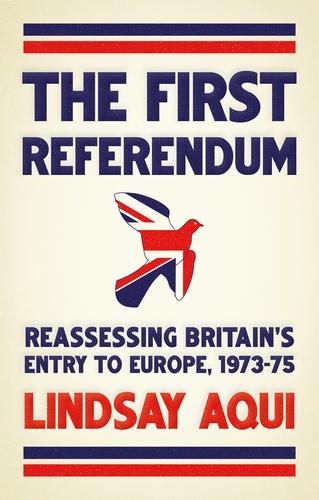
The First Referendum: Reassessing Britain's Entry to Europe, 197375
(Hardback)
Publishing Details
The First Referendum: Reassessing Britain's Entry to Europe, 197375
By (Author) Lindsay Aqui
Manchester University Press
Manchester University Press
14th July 2020
United Kingdom
Classifications
Tertiary Education
Non Fiction
European history
341.242094109047
Physical Properties
Hardback
328
Width 138mm, Height 216mm, Spine 19mm
526g
Description
In 1975 the UK voted 'yes', by 67%, to the European Community (EC). Since 1 January 1973, when the UK first joined, Edward Heath and Harold Wilson sought a fundamental transformation of the UK's relationship with the EC in terms of membership and public opinion. Despite the majority in favour of membership, the transformation was never achieved. -- .
Reviews
'Brexit raises important questions, not only about Britain's future relationship with Europe, but about its past. Was Britain always an "awkward partner" Could membership have taken a different course Lindsay Aqui's new book makes a valuable contribution to the contested history of Britain and Europe. Richly researched and clearly argued, it offers new insights into Britain's entry to the European Community, its early years of membership and its first national referendum in 1975.'
Robert Saunders, Reader in British History and Co-Director of the Mile End Institute, Queen Mary University of London
'In the wake of Brexit, Lindsay Aqui has written a timely and insightful study, based on exhaustive research, of how Britain's first ever referendum came to be held and decided. She shows that Harold Wilson was better-disposed to membership of the European Community than is often understood. Certainly, while his tactics showed striking parallels to those of David Cameron forty years later, they had a very different result.'
John Young, Professor of International History, University of Nottingham
'As Britain enters a new relationship with Europe, Lindsay Aquis book is a well-timed and compelling addition of a historians voice to this complicated and ever evolving relationship. Aqui adopts a multidisciplinary approach, relying on a rich source of different archives, press and public opinion polls to tell the story of the period 1973-1975 in a clear and accessible manner.'
Eirini Karamouzi, Senior Lecturer in Contemporary History, University of Sheffield
Lindsay Aquis well-researched and perceptive study shines important new light on Britains bumpy and difficult debut as an Economic Community member state. In the process the book tells us much that is new about the European policies of both Heath and Wilson. It is a fascinating read.
N. Piers Ludlow, Professor of International History, The London School of Economics and Political Science
'This book is a focused and highly original study on British government policies and public attitudes towards European integration during a short but crucial period of British membership in the European Community. Contrary to what the title of the book suggests, this impressive study goes far beyond a mere analysis of Britains first referendum on EC membership. The book also provides an in-depth analysis of Britains first three years of membership in the European Community and the Heath and Wilson governments attempts to change the Community from within.
Aqui convincingly stresses the continuities that existed between the Heath and Wilson governments and presents both Heaths European policy and Wilsons renegotiation of Britains terms of membership as two related attempts to change the Community from within. Both leaders were confronted with hostile public opinion and inner-party opposition and were under pressure to adapt Community policies to better suit British interests. Thus every round of negotiations in Brussels, be it on agricultural policy, the European Regional Development Fund or the British budget contributions were eminently political and scrutinized by anti-marketeers and the public at home. The Wilson governments renegotiation of the terms of membership and the resulting referendum are thus considered as an end-point of a first phase of membership during which Britain, and its political elite, were trying to come to terms with membership in the EC, rather than merely as an answer to Labours internal divisions on Europe.
Based on a wealth of archival sources, media and survey data Aqui seeks to explain the outcome of the 1975 referendum against the backdrop of longer-term debates and themes that have characterized the issue of British membership such as sovereignty, British standing and influence, prices and economic arguments. As the study convincingly demonstrates, the 1975 context of the referendum put to the forefront discourses on crisis and decline and meant that voters were cautious and more likely to choose the status quo. With this the book confirms ideas of British endorsement of membership in 1975 as largely unenthusiastic and short-lived.'
Katja Seidel, Senior Lecturer in the Humanities, University of Westminster
Author Bio
Lindsay Aqui is a Postdoctoral Fellow at the Bennett Institute for Public Policy, University of Cambridge
